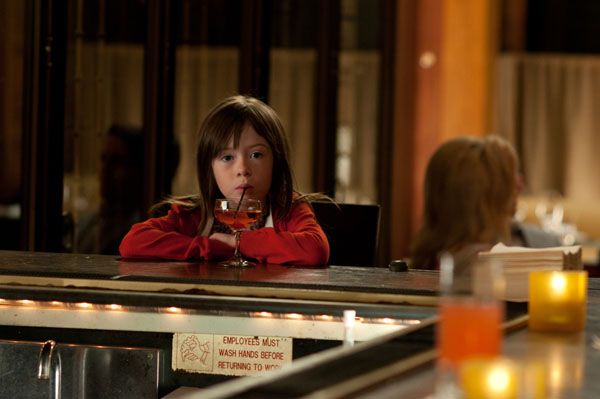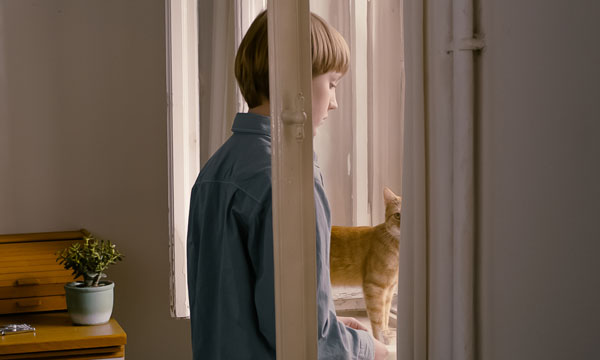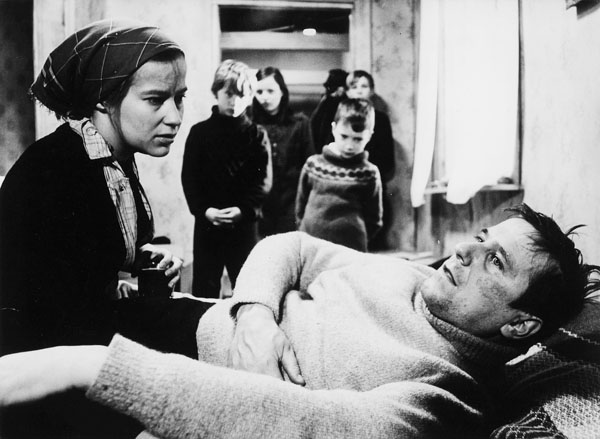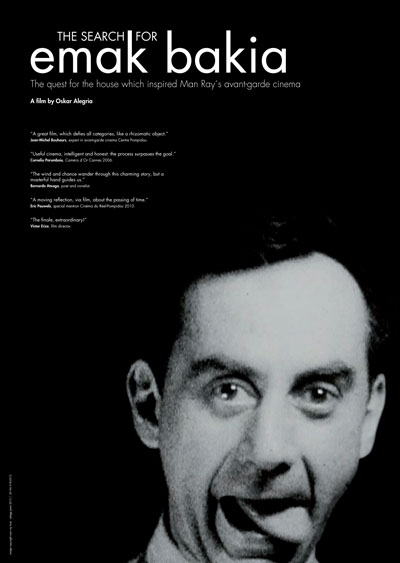The 56th San Francisco International Film Festival, opening today and running through May 9, will be the first since Ted Hope became executive director of the San Francisco Film Society last September. Hope’s impact on American independent film throughout the 90’s and 00’s is not to be underestimated. As a co-founder with James Schamus of Good Machine, he worked with the likes of Ang Lee and Todd Solondz, and the second company he co-founded, This is That, produced such films as Michel Gondry’s Eternal Sunshine of the Spotless Mind and Greg Mottola’s Adventureland. His gung-ho talks at film festivals and entries at his blog, whose name pretty well reflects the gist—Hope For Film—haven’t always sat well with some in the community (there’s even a Twitter account going by the handle @TedNope), but the Society clearly saw in his energy and drive for innovation the tonic it needed, having been hit hard by the loss of two previous directors in rapid succession, Graham Leggat, who expanded the scope of the Society’s organization, and, in January 2012, Bingham Ray.
For the SF Weekly, Casey Burchby talks with Hope about almost inadvertently landing the job and about his vision for the Society, now, in his words, “poised to have a transformative effect on culture. For the second year in a row, a film that the Film Society, through the help of the Kenneth Rainin Foundation, won the Grand Prize at Sundance. Whether it’s Beasts of the Southern Wild [in 2012] or Fruitvale this year, I think there’s no argument that these films wouldn’t have been made without the support of nonprofit institutions…. I think in San Francisco, we have the potential to be a launch-pad for artists, audiences, and the industry.”
For now, though, Hope’s all about SFIFF 2013. It opens with What Maisie Knew, marking, as Brian Darr notes, the “return of co-directing team Scott McGehee and David Siegel as festival guests for the first time since 2001, when they screened their remake of The Reckless Moment entitled The Deep End, and introduced a revival screening of Masahiro Shinoda’s Double Suicide; McGehee had studied Japanese cinema at UC Berkeley where he met Siegel, and the influence of the Japanese New Wave is evident in their first SFIFF selection, the 1994 festival film Suture.”
What Maisie Knew opens in New York on May 3, and, in the L, Henry Stewart writes: “The filmmakers can move Henry James’s novel of Victorian decadence to contemporary New York City because the underlying concept is timeless: some people are just really bad fucking parents. In this loose adaptation, Maisie is the small child of a rock singer played by Julianne Moore and an art dealer played by Steve Coogan—people who have come to despise each other. Both actors exceptionally craft two cancerously self-possessed people, petty and hysterical, destroying each other and everyone around them.” Even so, this is “a genuinely sweet film, held back by the directors from toppling into melodrama or sentimentality.”
There are several packages of capsule previews to turn to, but let’s start with Michael Hawley‘s since, among the dozen films he’s written up, there’s one I’d especially recommend myself, The Strange Little Cat, a “mini-masterpiece of choreographed chaos from Ramon Zürcher, a film student whose little movie made big noise at this year’s Berlin Film Festival. Save for a few flashbacks, the film is staged entirely within a cramped apartment as an extended German family spends the day hanging out and preparing meals…. A toy helicopter flies through the air, sausages squirt grease, a popping cork extinguishes the ceiling light and a little girl screams every time an appliance is in use… What’s nice is that amidst all this craziness, Zürcher’s characters are never reduced to human cartoons, but emerge as real people with relatable quirks and foibles.”
In the Bay Guardian, Cheryl Eddy focuses on five “must-see documentaries,” Roger Ross Williams’s “gripping, fury-fomenting” God Loves Uganda about American “prayer warriors”; Raoul Peck’s Fatal Assistance, a “searing investigation into the bungling of post-earthquake humanitarian efforts in Haiti”; Ilian Metev’s Sofia’s Last Ambulance, whose “depiction of the city’s medical care is grim at best”; Kalyanee Mam’s A River Changes Course, “a vividly-shot, meditative look at lives [in Cambodia] being forced to modernize”; and Kaspar Astrup Schröder’s Rent a Family Inc., “about Ryuichi, a Tokyo man whose business name translates to ‘I want to cheer you up.’ He’s a professional stand-in, offering himself or any of his rotating cast of staffers to pretend to be friends or relatives in situations, including weddings, where the real thing is either not available or won’t suffice.”
Finnish film scholar-director-programmer Peter von Bagh will receive this year’s Mel Novikoff Award, and Dennis Harvey introduces Bay Guardian readers to the one film many (including Aki Kaurismäki) consider to be Finland’s best, Mikko Niskanen’s Eight Deadly Shots (1972), “a five-and-one-quarter-hour rural tragedy starring Niskanen himself as a poor farmer doomed by both self-destruction and a ruthless social system. It’s not an ‘epic’ in the usual sense of narrative expansiveness. Rather, it’s an intimate, deliberately rough-hewn drama that simply takes a very long—but never dull—time to run its course.”
Kimberly Chun contributes to the SFBG‘s collection of capsules, beginning with Fernando Trueba’s The Artist and the Model “about an elderly sculptor finding and shaping his possibly finest and final muse.” With Claudia Cardinale, Jean Rochefort, and Aida Folch.
In the East Bay Express, Kelly Vance presents capsules of around twenty films. Hard to pick just one: “Of the many worthwhile documentaries in the 2013 SFIFF, Ben Lewis’s Google and the World Brain stands out for its sizzling topicality…. Futurists and similar pundits insist, among other things, that Google exists to monetize knowledge, and that despite its paid publicity, Google Books is not a library but a bookstore. If Google were somehow to own every book, all knowledge would carry a price tag.”
Writing for VCinema, Adam Hartzell concentrates on three films from Asia, Pedro González-Rubio‘s Inori, “as much about contemplation of the now as it is a snapshot of the voids in a town [in Japan] from which young folk have flocked away for better economic and social opportunities”; Yoon Jong-bin’s Nameless Gangster: Rules of the Time with Choi Min-shik—”the other standout for me was Kwak Do-hwan”; and Kim Longinotto’s Salma, about “the most celebrated female poet in the Tamil language” who wrote much of her work “while imprisoned by her family and in-laws for 25 years.”
Back in the SF Weekly, Sherilyn Connelly picks ten must-sees and talks with Rick Prelinger about No More Road Trips?, “a found-footage presentation constructed entirely from mid-20th century home movies of people driving from New York to California, back in the days when driving across the country was something middle-class families could actually afford. To create the current cut, which is still a work in progress, Prelinger narrowed a pool of 4,000 home movies to 500, with about 60 families represented.”
Meantime, Molly Bernstein’s doc Deceptive Practice: The Mysteries and Mentors of Ricky Jay has Fernando F. Croce thinking in Film Comment about the auteur as magician.
Updates, 4/29: On Saturday, Steven Soderbergh delivered SFIFF’s tenth annual State of Cinema Address and requested that it not be recorded—by the audience, that is. The Society has a recording, but that’ll be put in storage for some time, one assumes. At any rate, Joseph Beyer live-tweeted the thing as fast as his thumbs could thump, and Eric Escobar has used that stream as an outline he’s fleshed out from memory. Steve Rhodes has gathered more tweeted photos and comments as well.
And this happened on the following Monday: “Due to unprecedented demand, Steven Soderbergh has given The San Francisco Film Society permission to release this video that was recorded initially only for archival purposes.”
Brian Darr has two recommendations. James Sansing‘s Verses “absolutely stunned me”; and: “If documentaries shine clarifying light into mysterious corners, Leviathan illuminates just how literally tenebrous a subject can be. Bookendend in blackness, brushstrokes of light captured by ultra-portable videocameras paint, detail-by-detail, what ultimately becomes a canvas illustrating the workings of a Northeastern seafood trawler. First harshly machine-like, this floating factory’s human operation comes into focus before fade-out.”
Michael Guillén presents “a preview of the Ibero-American and/or Latin American entries.”
Back for a moment to What Maisie Knew. For the record, Chris Cabin, writing at Slant finds it to be “an abhorrent slice of tasteless familial drama.” Then again: “This must be the sunniest Henry James movie ever made,” writes Terrence Rafferty in the New York Times. “Purists may squawk, and they’d have a point, but James is so movie-resistant anyway that it hardly seems worth the effort to be outraged. The movie doesn’t ‘get’ him because he can’t be gotten, really, in any medium other than the one in which he so meticulously labored.”
Updates, 5/2: The SFBG’s posted another round of capsules in this week’s issue. Dennis Harvey recommends Invasion of the Body Snatchers: “Yes, Vertigo (1958) is very nice. But here is my alternate choice for Best San Francisco Movie Ever: 2013 SFIFF tributee Philip Kaufman’s 1978 remake of the 1950s sci-fi classic. Donald Sutherland, Brooke Adams, Jeff Goldblum, Veronica Cartwright, and Leonard Nimoy are among the locals who get very paranoid—with no pot brownies involved—when everyone around them starts turning coldly conformist…. Wonderfully creepy, eccentric, stylish and humorous, it was Kaufman’s first commercial success. He will appear at the Castro screening to discuss it, his career in general, and to accept his Founder’s Directing Award.” That happens Sunday. Then, on Tuesday, there’s Paul Leni‘s Waxworks (1924), “considered one of the great classics of German Expressionist cinema…. SFIFF’s annual silent film extravaganza at the Castro will be accompanied by a stellar quartet of musicians playing an original score: Mike Patton, Scott Amendola, Matthias Bossi, and William Winant. Expect an eclectic and propulsive evening of sounds equally schooled by punk, prog rock, and jazz.”
In the SF Weekly‘s second round, Jonathan Kiefer recommends, among other films, Sophie Fiennes and Slavoj Žižek’s The Pervert’s Guide to Ideology and František Vláčil’s Marketa Lazarová (1967): “Shown in tribute to late SFFS board chairman and world-cinema aficionado George Gund III, who liked to say it ‘expands with every viewing,’ this dreamy 1967 Czech epic of Medieval clan rivalry deserves a big screen.”
Brian Darr recommends Sofia’s Last Ambulance (2012): “In this portrait of three members of an ambulance unit in Bulgaria’s capital city, close-ups captured both by dashboard-mounted cameras and by director Ilian Metev in scenes in which the team deals directly with patients, seem less an aesthetic strategy than an ethical strategy, allowing patient faces to remain anonymous for privacy’s sake. But an ethical strategy becomes an aesthetic one by fiat, allowing these three medical professionals to become the true centers of identification in what becomes a story about their compassion and heroism in the face of a cash-strapped municipal health system.”
Meredith Brody posts a dispatch to Thompson on Hollywood and Parallax View is running Peter Hogue‘s Movietone News report from the 20th SFIFF, which originally ran in 1977.
Updates, 5/3: Tomorrow, Saturday, May 4, the Pacific Film Archive will present three of Blank’s newly restored 16mm films: the West Coast premiere of the restoration of Spend It All, a 1971 documentary celebrating Cajun food, music, and culture, and world premieres of the rarely seen Chicken Real (1970) and Christopher Tree (a.k.a. Spontaneous Sound [1972]). Among the documents and recollections posted to the PFA’s blook: Blank’s instructions for setting up SmellaRound.
William Friedkin, who won a Golden Gate Award for his first documentary at SFIFF in 1962, will be presenting a master class at Sundance Kabuki Cinemas on Wednesday, May 8.
Update, 5/6: Don’t miss Frako Loden‘s dispatch here in Keyframe; and meantime, Terri Saul at Hell on Frisco Bay: “Oskar Alegria’s The Search for Emak Bakia is not a film that was made in the editing room; it was lived. The rough translation of Emak Bakia is a Basque term meaning, gruffly, ‘Leave me alone.’ Ekphrastic, the film-slash-poem-slash-collage, is a work of art that is made in reaction to, or to explore, another work of art, a 1926 film by Man Ray. It is art as dialog, a dialog requiring patience…. The SFIFF audience reaction was a highlight of Saturday’s experience. Alegria’s curiosity made the audience curiouser and curiouser, alive, observant, awakened.”
Updates, 5/11: Mark Lukenbill has the full list of award-winners at Indiewire. One of them is Belmin Solyemez’s Present Tense, winner of the New Directors Prize (honorable mentions: William Vega’s La Sirga and Adrián Saba’s The Cleaner). Brian Darr: “I have not seen Present Tense yet so let me excerpt from an absolutely fascinating article that uses this digital feature as an example of the kind of film being crowded off even Turkey’s screens thanks to homogenization pressures created by wholesale DCP conversion of cinemas, written by Emine Yildirim: ‘Mina could be the epitome of many women living in this country—aching for a better and more independent life in the midst of uncertainty and economic destitution. The fortune telling sequences in which Mina’s predictions are juxtaposed with the faces of many different women promises to become a classic in Turkish cinema; for those of us who live in this culture always want to hear the same future: a way out of our brooding existence into a refreshing place with certain happiness and good fortune.'”
Meantime, Ryland Walker Knight posts a list of “what I saw at SFIFF in rough estimation of preference. More than half are shorts.”
For news and tips throughout the day every day, follow @KeyframeDaily on Twitter and/or the RSS feed. Get Keyframe Daily in your inbox by signing in at fandor.com/daily.










